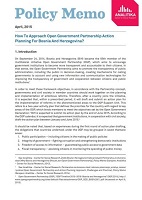How to Approach Open Government Partnership Action Planning for Bosnia and Herzegovina?
How to Approach Open Government Partnership Action Planning for Bosnia and Herzegovina?
Author(s): Not Specified Author
Subject(s): Politics, Communication studies, Government/Political systems, Policy, planning, forecast and speculation, Corruption - Transparency - Anti-Corruption
Published by: Analitika – Centar za društvena istraživanja
Keywords: BiH; government; communication; partnership action planning;
Summary/Abstract: On September 24, 2014, Bosnia and Herzegovina (BiH) became the 65th member of the multilateral initiative Open Government Partnership (OGP), which aims to encourage government institutions to become more transparent and accountable to their citizens. In that sense, the Open Government Partnership aims to promote the transparency of public administration, including the public in decision-making, creating mechanisms for calling governments to account and using new information and communication technologies for improving the transparency of government and cooperation between citizens and public institutions. In order to meet these framework objectives, in accordance with the Partnership concept, governments and civil society in member countries should work together on the planning and implementation of ambitious reforms. Therefore, after a country joins the initiative, it is expected that, within a prescribed period, it will draft and submit an action plan for the implementation of reforms in the aforementioned areas to the OGP Support Unit. This refers to a two-year activity plan that defines the priorities for the country with regard to key areas of the OGP, which binds members to meet the objectives set by the Open Government Declaration. BiH is expected to submit its action plan by the end of June 2015. According to the OGP calendar, it is expected that government institutions, in cooperation with civil society, draft the action plan between January and June 2015. It should be noted that, based on experiences during the first round of action plan drafting, the obligations that countries undertook under the OGP may be grouped in seven thematic areas: 1. Public participation – including citizens in the making of public policies 2. Integrity of government – fighting corruption and strengthening democratic institutions 3. Freedom of access to information – guaranteeing public access to government data 4. Fiscal transparency – assisting citizens in monitoring the spending of public money 5. Public service provision – providing services useful to citizens 6. Extractive resources transparency – ensuring that income from extractive resources is used for public benefit 7. Openness of data – digitalization and opening government data to the public in order to ensure transparency and access to information It is especially important to stress that work on action planning implies close cooperation between relevant public institutions and civil society organizations in defining priorities and activity plans. Strengthening the dialogue and cooperation between government and civil society is considered a key step in the drafting and implementation of the action plan, which is one of the main aims of the Partnership. Therefore, under the Partnership, governments are requested to, inter alia, submit reports on the quality of the dialogue and cooperation with civil society during the development and implementation of the action plan. Moreover, cooperation between government and civil society is also evaluated within the independent reporting mechanism on the drafting and implementation of the action plan. However, a serious problem with BiH is that months after the state formally joined the OGP, nothing has essentially been done in this area, so that in April 2015, just three months before the deadline for submission of the action plan, the action plan drafting process has not begun. Bearing in mind that the action plan should be prepared and submitted by the end of June 2015, the question arises whether it is possible to start the process of action planning in the remaining three months while undertaking wide consultations in accordance with the standards and principles of the Partnership. The second question is, how to conceptualize the consultation process during the drafting of the action plan in order to include as wide a circle of interested stakeholders as possible and get the best possible proposals?
Series: Analitika - Policy Memo
- Page Count: 6
- Publication Year: 2015
- Language: English
- Content File-PDF

